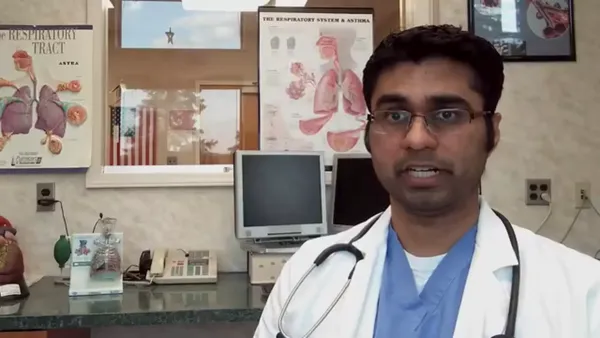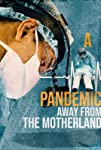Eye For Film >> Movies >> A Pandemic: Away From The Motherland (2020) Film Review
A Pandemic: Away From The Motherland
Reviewed by: Jennie Kermode

Around 14% of doctors in the US were born in India. In the UK that number is closer to 20%. It's an accident of history, the natural consequence of a shared language and the gap between the high quality of education that India's top schools provide and the wages its economy can sustain. Since the Covid-19 pandemic began, it has become vital, because Indian medical schools teach their students how to deal with pandemics whereas - shockingly - most Western ones do not. As a consequence, disproportionately high numbers of Indian doctors - and nurse, and support staff - have ended up on the front lines against the disease.
What is it like to take on such a risky and demanding role in a foreign country, without parents or siblings around to provide support? Sweta Rai's documentary introduces five doctors who know all too well. Their stores sit side by side with the testimony of family members back in he motherland - parents caught between pride in their children and desperate fear. The doctors know that their separation is helping to keep their parents safe, that it wouldn't be safe to leave a hospital and go straight over to hug them anyway, but the weight of distance adds something indefinable, an additional strain. It also adds a different perspective which may help Western viewers to understand the global impact of the disease a little better.
Worldwide, Covid-19 is killing 3% to 6% of those it infects. In some places, where populations are malnourished and there's a severe shortage of medical resources, it's as high as 25%. Many survivors are left with lasting disability - we don't know, as yet, whether or not they'll ever recover. One doctor speaking here speaks of the impossibility of avoiding emotional connections with patients, how distressing it can be to lose just one, and how at no point in his career has he ever known so many of his patients to die so fast. In one haunting shot we see a hospital corridor lined with gurneys, each one bearing a body bag. Even in war zones, this is not a normal sight. The long term psychological effect on those dealing with such things daily is another unknown.
Because they are exposed to large quantities of the virus, front line workers face an elevated risk of severe infection. One doctor here talks about her own experience with the disease, including the stage, now familiar to many, when she told herself that the symptoms she was experiencing must be caused by something else, the reality of infection with such a dangerous disease being difficult to take in. She described her growing fear., and the disconcerting ritual she had to adopt to keep her husband and children safe. The awareness, then, that her work in the hospital had been putting them in danger even before she knew she was infected - a reason why many such workers have now separated themselves even from those family members who live nearby, again reducing their own support systems.
Rai's film is bookended by remarks about heroes which sound painfully twee. What the film observes supports that contention much better. It's not all about suffering, however. One doctor talks about his work with lung patients, about performing the first double lung transplant carried out on a Covid-19 patient. He remembers a transplant patient in her twenties thanking him for not giving up on her. Elsewhere, doctors explain how much words of thanks from patients mean to them. They reflect on the support offered by colleagues and strangers and on how public gestures have helped them to cope.
Alongside their reflections on their recent experiences, the doctors talk about growing up with a passion for medicine, about working hard in a society where intellectual achievement remains highly valued, and it's a wonderful antidote to many public conversations elsewhere in the world - a reminder of what certain other nations once aspired to and why that matters. There's a great deal of excitement about the potential for improved understanding, alongside passion for helping others. Parental pressure has played a role too, of course - one wonders if such families will ever have the opportunity to feel equally proud of the children they encouraged to become lawyers.
An important film which makes the science of he pandemic more accessible without dumbing it down, this is also a useful contribution to the historical record and a gesture of thanks to those risking their lives to protect the rest of us.
Reviewed on: 15 Oct 2020


















